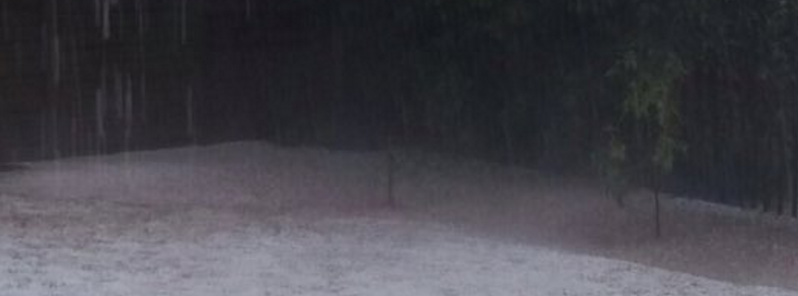After record breaking heat, severe hailstorm pounds South Africa

An intense hailstorm hit Johannesburg, South Africa, on January 9, 2016, covering the grounds with a thick snow like layer, a sight quite unusual for the summer period. An outbreak of severe weather led to the collapse of a shopping center in Johannesburg suburb. According to the local authorities, this was the strongest recorded hailstorm in the last couple of years.
After being battered by several heatwaves, the Johannesburg area was hit by a powerful thunderstorm, likely triggered by an intrusion of cold dry air in the upper atmosphere. Hail stones the size of a golf ball battered the area, and numerous severe thunderstorm watches and warnings were issued by the South African Weather Service across the northeastern part of the country during the afternoon and evening of January 9 (local time).
Hailstorm in krugersdorp #hailsorm #haildamage pic.twitter.com/OBQB63lQ5j
— Renette Denysschen (@RenetteDenyss) January 9, 2016
"The Johannesburg area has been in the grips of extremely hot and dry air this week, establishing new all-time record high temperatures. It appears that some cooler and more humid air started to push in from the south and east on Saturday, likely triggering these thunderstorms," weather.com senior digital meteorologist Nick Wiltgen said.
@HEEL_Darewolf and @KehliJ big moerse hail hitted parts of Johannesburg, Roodepoort and Krugersdorp pic.twitter.com/X16edWqVmY
— 2016_SA_200 (@LarryftNiam_pdp) January 9, 2016
"Weather balloon data from Pretoria a few hours before the hailstorm showed an obvious intrusion of cold dry air in the upper atmosphere, a factor that strongly favors damaging hail when overall conditions are favorable for thunderstorm development," he added.
Summer hailstorm batters Johannesburg area, destroys shopping mall roof (PHOTOS): A violent hailstorm has wreaked… https://t.co/kIJs0qsP7J
— Peter (@Studio4News) January 10, 2016
The rooftop of the Key West Shopping center in Krugersdorp collapsed around 4 pm (local time) after which the building was evacuated. Luckily, no injuries were reported.
The severe weather hit the region only days after new historical high temperature records were established. First record breaking temperature high of 38.3 °C (100.9 °F) was measured on January 6, followed by 38.9 °C (102 °F) on the next day. Previous record breaking temperatures of 36.5 °C (97.7 °F) in the area were only measured on November 11, 2015.
The HUB shop collapsed at keywest mall Krugersdorp… Really bad.. #heavyrains pic.twitter.com/y1y47bVuAZ
— TSWELOPELE MATHIBELA (@mathipsto) January 9, 2016
High temperatures set new records in the Pretoria capital, as well. Old records set in 1960 were broken on a few occasions during spring and summer 2015. During November 10 and 11, 40.3 °C (104.5 °F) was reported, followed by 41 °C (105.8 °F) on December 7. On January 6, this record was tied and then crushed the next day, as mercuries rose to 42.7 °C (108.9 °F).
The western part of the country is also suffering from extreme heat conditions, and numerous fire danger warnings have been issued on a few occasions. Two deaths caused by heat stroke were reported on January 9. Over the last couple of days, a total death toll in the region was 11.
#hailstorm from yesterday at the @DimensionData campus. Looked like a #WinterWonderland! #Johannesburg #weather pic.twitter.com/hZVrfAE3Ag
— supervillain laundry (@supaflyza) November 17, 2015
This spring and summer in South Africa have generally been known for record breaking heat conditions. In Vredendal, an all-time world record high for the month of October was set as temperatures rose to 48.4 °C (119.1 °F). 48.6 °C (119.5 °F) was reported in the Augrabies Falls National Park earlier in the week.
Featured image: Hailstorm, Johannesburg, South Africa, January 9, 2016. Image credit: @DMvHeerden

IF,you guys LISTENED TO “GODS” PROPHETS,like you were commanded in the HOLY BIBLE,you’d already know PLANET EARTH IS IN FOR IT,…NIBIRU approches and the weather will get wilder and wilder,till its UNPREDICTABLE,earthquakes and storms beyond imagination,The world you knew is ENDING,and you’ll likely learn this the hard way………